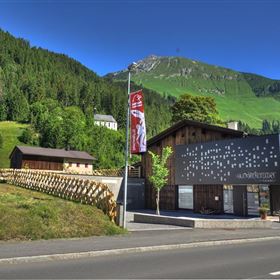The museum "Wunderkammer
As a guest in Elbigenalp, or as the Lechtalers like to say - in the "Duarf", you should not miss the exhibition and museum "Wunderkammer". Here you can learn about the culture and history of the Lechtal people through the eyes of the collector and lithographer Johann Anton Falger and marvel at his extensive collection of art and curiosities.
Johann Anton Falger - the father of the Lech Valley
The painter, lithographer, engraver, anthropologist, geologist and custom researcher Johann Anton Falger was one of the last universal scholars of the late classical period and is considered the father of the Lech Valley. His work significantly shaped the image of the valley and his influence can still be felt. For example, Falger founded a drawing school to provide Lechtalers with a sound education and paved the way for the famous painter Anna Stainer-Knittel; today the school is a renowned training center for arts and crafts and design.
His private collection contains artifacts from the most diverse areas of Lechtal life, and all those things that he could not preserve for posterity in the original were meticulously recorded by him or explained and named in the countless diaries, chronicles and almanacs in his possession.
Falger learned his craft at the Academy of Fine Arts in Munich, and his further life took him to Weimar and later back to his native Lech Valley. He already had a deep friendship with Queen Mother Marie of Bavaria, the Alpine Rose Queen, in Munich and the Queen spent numerous summers with her two sons Ludwig and Otto in Elbigenalp. After his death, Falger even bequeathed his house to her, with all the treasures and oddities that had accumulated in it.
Collection from the Renaissance
Thanks to its extensive collection, today one can marvel at numerous copies of important historical documents, climate studies, anatomically accurate drawings, geological finds, examples of old Lechtal costumes and numerous other exhibits in the Wunderkammer. The history of the Wunderkammer dates back to the Renaissance, when wealthy citizens, princes, scholars and scientists collected strange artifacts and evidence of amazing historical events in their cabinets of curiosities and made them accessible to interested admirers. Falger tried to gain insight into as many fields of knowledge as possible in his collection and meticulously documented every detail, no matter how inconspicuous, with the curiosities and peculiarities of Lechtal history, culture and population.
In the museum "Wunderkammer" you can marvel at Falger's collected exhibits and also get an insight into the historical development of the valley. The museum is located in the former Elbigenalp doctor's house. The modern museum concept is that a small part of the exhibition is permanently open to visitors and during regular opening hours you can take a deeper look into the Wunderkammer of the last scholar of the Tyrolean Lech Valley.
